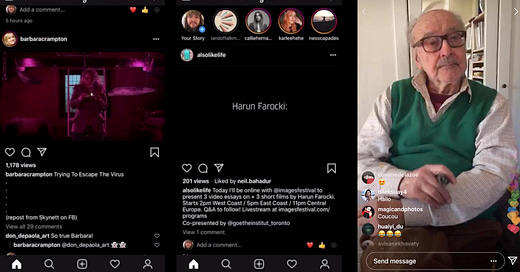Scout Tafoya's "Xenolith Atlas" Deals with Depression and Content, Quarantine Be Damned
A must see.
Dear Moviegoers,
It's more than likely that Instagram and other apps of its kind don't so much measure where the world is at but, instead, they're screens upon screens - filters upon filters - that can shut out most of the world from where people are at individually, even collectively sometimes. This is an interesting thought as everyone comes to grips with what happened during the Covid quarantines, and the "content" that so many consumed in that period. Imagine - all the people...
Xenolith Atlas acts as part video essay and part docu-narrative, where occasional but significant voiceover - softly spoken and ghostly quiet - comes the closest to being a literal protagonist, and where vertical videos become Herzog-like diary entries. To pinpoint just when or from where the film begins feels like a task or trial, and really feeds into whether or not this film is about one experience with depression or the global experience. I didn't hear the words Covid or pandemic once in the movie, nor did I ever see a mask worn. Months are counted and time becomes like a weighted necklace, getting heavier and heavier as the light turns dark. If I think of Xenolith Atlas as the dramatic variation on Skinamarink’s horror, then indeed we can begin from somewhere. And that somewhere is home.
A blast of social media video turns into an empty and blurry beach, behind a dusty and dirty window. A long stillness comes, where one spec of crud on the window is the focal point. Such specs on such windows run throughout the movie, becoming a motif not unlike floating dust and falling bubbles in Albert Birney/Kentucker Audley's Sylvio. These are moments of zen, like staring at a blank wall while the world turns around you. So many thoughts come alive, and I have to believe that there's peace found in these bubbles, these specs of crud, these pieces of dust in the sunlight. Home is where the story begins, and that can be on our phones and at the beginning of time itself; on a beach. Take that Space Odyssey and run with it, why don't ya?
Filmmaker and critic Scout Tafoya, to whom I owe a review of his film Eyam, is at a height in his game so to speak, and I don't see a ceiling coming in the way. Xenolith Atlas is at its very best when struck by Scout's nerves, like when the voiceover says "It would be ironic if they killed you after all of this." He takes saved video from the late Jean-Luc Godard's live Instagram Q&A and juxtaposes it with a scene from From Beyond and a blank space in between, forming a triptych in lagging unison, where words fade and the screen takes control, perhaps from Scout even. This is what happens when too much time is spent with oneself. The screen becomes a filter, and the filter becomes a window. A window to what?
A song on a podcast plays, with the chorus "Hey, Larry, it's your best friend Jim!" sticking out. Mentally, I've been there. And clearly, the voice-over protagonist is in his own... hell? By the end of Xenolith Atlas, there's a sense of celebration that is expected or really that most audiences have been trained to expect from a dour tour. Indeed, there's a concert. Indeed, there's some upbeat music. But is anything better? I'm not sure, and I don't think the film is either. The last shot is of the wing of a plane, from a passenger seat, as it flies in operation. Blurred a bit, but the focus is again on a spec of something in the frame, or a blinking light just far enough away. While the attention economy acts as an escape in the present, it can still become a scheme down the line. No, this isn't hell. It's just Earth. It's just home.
From plane to plane, city to city, there are sights and sounds to remember in the vast noise of content, real or seen on a screen. A vertical one. Tafoya observes content in a time of grief and feels life in a time of content with the gestures and the strokes of a poet - sometimes borrowed from the best, sometimes off the top of his head. His Xenolith Atlas isn't just a brave and astute essay on living "in place" and out of space, but it's also one of the best examinations of the world as it is at this moment.
At Xenolith's concert finale, Scout closes his film with a song that has the standout lyric "I don't want to see the world, I just want to see you." From there, the wing of a plane. Again. Whether it moves or not, the world has been seen and will continue to be seen through screens. What else will we watch when wide awake but zonked out in bed? 5/5
Xenolith Atlas streams on Recycled Screenings until the end of January.







